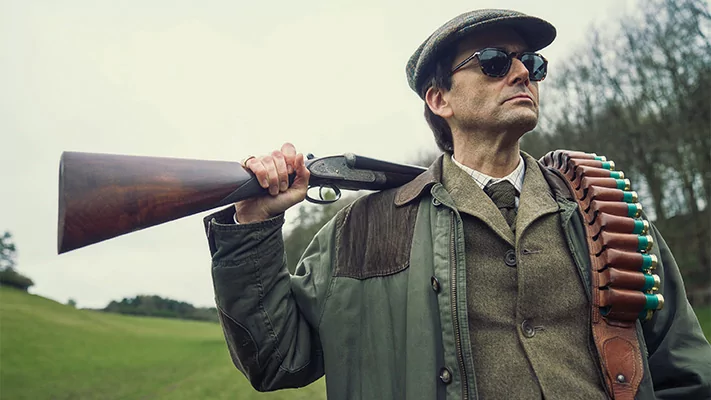
Based on a novel by the British romance writer Jilly Cooper, whose bestselling Rutshire Chronicles were dubbed “bonkbusters” by the British press in the 1980s, Rivals is salacious but smart. Co-produced, somewhat improbably, with Disney+, the Hulu series is an unabashedly pulpy new eight-part comedy-drama about greed and libido among the upper classes of Margaret Thatcher-era England. It is not always subtle, nor is it something you should watch with your children or mother-in-law: Almost the show’s first image is of a hedonistic British aristocrat’s thrusting buttocks as he and a female journalist join the supersonic-and-mile-high club on a trans-Atlantic Concorde. Think of it like Succession or Industry with 10% less self-seriousness and 10% more Gossip Girl energy. In other words, it’s the most fun you can have with clothes on.
England, circa 1986, is experiencing its own version of the “greed is good” years satirized in Oliver Stone’s Wall Street. As the Conservative government enters its seventh year in power, the economy is booming, Bryan Ferry and Bonnie Tyler are eating up the charts, and it’s an excellent time to be rich — whether to the manor-born or upwardly mobile. The vaguely Murdoch-esque Lord Tony Baddingham (David Tennant) is an English entrepreneur who wants to shake up staid British broadcasting. He and his hotshot American producer Cameron Cook (Nafessa Williams) are determined to challenge the seeming hegemony of the BBC with Baddingham’s independent television company, Corinium.

With the help of a generous check and promises of editorial latitude, they poach the edgy Irish TV presenter Declan O’Hara (Aidan Turner) and persuade him to move from London to the rustic but tony Cotswolds, where Corinium’s broadcast operation is based and Baddingham lives with his old-money wife, Lady Monica (Claire Rushbrooke). O’Hara’s own restless wife, Maud (Victoria Smurfit), and daughters, Taggie (Bella Maclean) and Caitlin (Catriona Chandler), reluctantly uproot themselves for a new life as country squires in a huge old mansion.
Here, the urban and left-wing O’Haras acclimate to a new lifestyle of fox hunts, bird shoots, and black-tie New Year’s Eve parties. They also meet some of their new neighbors. Those include an arriviste couple, the tech businessman Freddie Jones (Danny Dyer), an innovator in satellite TV, and his class-insecure wife, Valerie (Lisa McGrillis). There is also a soft-spoken local writer, Lizzie Vereker (Katherine Parkinson), who, we may guess, has something of Cooper in her. She writes steamy novels whose erotic charge is not matched in her unhappy marriage with her self-absorbed husband (Oliver Chris).
That’s not to forget Rupert Campbell-Black (Alex Hassell), who possesses the buttocks first glimpsed in the show’s first scene and lives out here as well. The handsome and divorced Campbell-Black is an old-money rake, champion showjumper, and Conservative MP now serving as Minister of Sport. He’s also the apple of the eye of every woman in Rutshire County. That includes, soon, 20-year-old Taggie, who meets him when she accidentally stumbles upon his nude tennis match with another man’s wife (Emily Atack).
There are eight hours of characters, subplots, and a generally decadent atmosphere, but Rivals’s main arc concerns a battle over control of a TV license and various related intrigues, entanglements, and jealousies, some of which are exacerbated by the Rutshire gentry’s rather casual approach to marital fidelity. Carnal entrapments are presented with a regularity and graphic frankness to rival Game of Thrones.
CLICK HERE TO READ MORE FROM THE WASHINGTON EXAMINER
This is not to say, however, that the show is merely Hulu’s reinvention of cable softcore porn: Most of the show’s characters, who start out seeming like the broadest of chick-lit archetypes, soon turn more interesting and developed, and the show is a fairly well-observed time-capsule snapshot of the class and cultural anxieties of its time and place. Some of its shadings may even fly past American viewers: At one point, Baddingham, a “grammar school boy” of relatively humble origins, uses the term “lounge” and quickly corrects himself to say “sitting room.”
Rivals has a satiric edge, but it’s not going for a Tom Wolfe-ian sweep. That works just fine for what the show is and what it wants to be. Elsewhere in Britain, there may be coal miners striking and football hooligans battling, but you’re hard-pressed to find any among the sturdy Tory hedgerows of Rutshire. It’s hard to resist Rivals’s big-shouldered suits or the pure serotonin injections of constant slow-motion camera pans set to New Wave needle-drop music cues. In a recent interview with the New York Times, Cooper said her main purpose in writing the Rutshire novels was to cheer people up. Watching this adaptation, it worked for me.
J. Oliver Conroy’s writing has been published in the Guardian, New York magazine, the Spectator, the New Criterion, and other publications.






